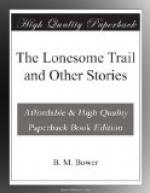“Old Dock” was a land-mark among old-timers. The oldest pioneer found Dock before him among the Indians and buffalo that ran riot over the wind-brushed prairie where now the nation’s beef feeds quietly. Why he was there no man could tell; he was a fresh-faced young Frenchman with much knowledge of medicine and many theories, and a reticence un-French. From the Indians he learned to use strange herbs that healed almost magically the ills of man; from the rough out-croppings of civilization he learned to swallow vile whiskey in great gulps, and to thirst always for more.
So he grew old while the West was yet young, until Dry Lake, which grew up around him, could not remember him as any but a white-bearded, stooped, shuffling old man who spoke a queer jargon and was always just getting drunk or sober. When he was sober his medicines never failed to cure; when he was drunk he could not be induced to prescribe, so that men trusted his wisdom at all times and tolerated his infirmities, and looked upon him with amused proprietorship.
When Weary galloped up the trail which, because a few habitations are strewn with fine contempt of regularity upon either side, is called by courtesy a street, his eyes sought impatiently for the familiar, patriarchal figure of Old Dock. He felt that minutes were worth much and that if he would save Patsy he must cut out all superfluities, so he resolutely declined to remember that cold, foamy beer refreshes one amazingly after a long, hot ride in the dust and the wind.
Upon the porch of Rusty Brown’s place men were gathered, and it was evident even at a distance that they were mightily amused. Weary headed for the spot and stopped beside the hitching pole. Old Dock stood in the center of the group and his bent old figure was trembling with rage. With both hands he waved aloft his coat, on which was plastered a sheet of “tangle-foot” fly-paper.
“Das wass de mean treeck!” he was shouting. “I don’d do de harm wis no mans. I tend mine business, I buy me mine clothes. De mans wass do dees treeck, he buy me new clothes—you bet you! Dass wass de mean—”
“Say, Dock,” broke in Weary, towering over him, “you dig up some dope for tin-can poison, and do it quick. Patsy’s took bad.”
Old Dock looked up at him and shook his shaggy, white beard. “Das wass de mean treeck,” he repeated, waving the coat at Weary. “You see dass? Mine coat, she ruint; dass was new coat!”
“All right—I’ll take your word for it, Dock. Tell me what’s good for tin—”
“Aw, I knows you fellers. You t’inke Ole Dock, she Dock, she don’d know nothings! You t’ink—”
Weary sighed and turned to the crowd. “Which end of a jag is this?” he wanted to know. “I’ve got to get some uh that dope-wisdom out uh him, somehow. Patsy’s a goner, sure, if I don’t connect with some medicine.”
The men crowded close and asked questions which Weary felt bound to answer; everyone knew Patsy, who was almost as much a part of Dry Lake scenery as was Old Dock, and it was gratifying to a Flying-U man to see the sympathy in their faces. But Patsy needed something more potent than sympathy, and the minutes were passing.




